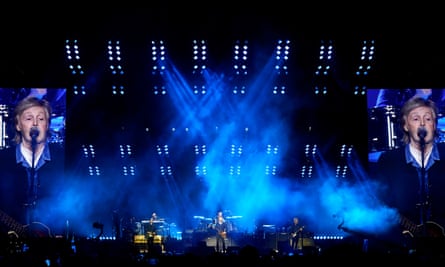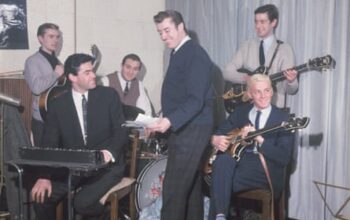Towards the end of Come on to Me – a song about sexual chemistry from the near-end of the Paul McCartney solo catalogue – the 82-year-young musician whips off his blue jacket, displaying its elegant patterned lining. The reaction is wildly appreciative, if not quite the one that once met this former teenybopper idol at the screaming height of Beatlemania. “That is the biggest wardrobe change of the evening,” he quips. (Swapping his Höfner bass for an electric guitar several times doesn’t count.)
Welcome, then, to the eras tour – no, not that one, another one; one where costume changes are in inverse proportion to the number of lifetimes and cultural disruptions it spans. The McCartney timeline goes deep; inextricable from world events. The mood tonight is one of witnessing history, with clots of multigenerational fans luxuriating in the songs that moved tectonic plates and carved glaciers, shaping everything that came after.
The Quarrymen – the Beatles-to-be – recorded In Spite of All the Danger in 1958 when Elvis Presley was in the army, the peace symbol was adopted by the Campaign for Nuclear Disarmament and BOAC began ferrying air travellers across the Atlantic. The ingredients of the Beatles’ catalogue were all there: confidence in their material, vulnerable romance, not to mention George Harrison’s contribution.
Tonight, on the 2024 leg of McCartney’s Got Back world tour (it began in 2022, with a memorable pit stop at the Glastonbury festival), it feels like a time capsule opened in an unimaginably different future, where the pace of change, fast then, now approaches greased quantum velocity. McCartney’s long-serving, characterful band all play the track standing up at the front of the stage, old-school. Behind them, strange video montages play with time, subbing modern McCartney and recent Ringo Starr into scenes where they lark about with their vintage bandmates and erstwhile selves, like a fantastically expensive advert for the Google Pixel phone’s 2024 “Add Me” feature.
By contrast, the most recent release McCartney plays is 2023’s 1970s-era John Lennon demo Now and Then. Unveiled just over a year ago, its recording featured input from all four Fabs across the decades. Tonight, it once again reasserts a sense of unity lost circa 1969-70. If McCartney were not the de facto keeper of the Beatles flame, you do wonder whether Lennon or Harrison would have shored up the band’s group identity quite as hard as he has done.
Tonight’s three-hour set is all bonhomie and bittersweetness, folding the McCartney Beatles canon into rather a lot of Wings songs and a smattering of solo material, with a few fond diversions. Something – a Beatles song written by George Harrison – begins on a ukulele Harrison gave McCartney. One of Wings’s greatest tunes, the heartfelt Let Me Roll It – inspired by a Harrison lyric, its electric blues riff amped right up tonight – ends with a fulsome gnash through some of Foxy Lady in tribute to Jimi Hendrix.
At no point during this wide-ranging set do you get a sense of an artist wrestling with his legacy, striving to assert any kind of authoritative narrative stamp. It’s just all here – a dizzying range from magnificent to mass market (Wonderful Christmastime, complete with children’s choir) and back again. Here is McCartney the balladeer, the perky everyman, the sonic aggressor (Helter Skelter) and the weird music hall oompah merchant (Ob-La-di Ob-La-Da, which gains from the ska inflections of the Music City Horns, a skanking trio of brass players).
We’re reminded of how far some things have come. McCartney’s introduction to a lovely rendition of Blackbird recounts the Beatles’ Liverpudlian incredulity at being expected to play for a segregated audience in Jacksonville, Florida in 1964 (they refused, forcing the authorities to back down). Wings’s Let ’Em In is all about inclusivity, not postcode lotteries.

We’re reminded of how far there is to go as well, and how a kind of resilient, wise forbearance is key in order not to give in to despair. That’s Let It Be, a late-set reminder of exactly how beautifully McCartney resonated with the Beatles’ tumultuous times – an attribute most often handed to Lennon. (Not only that; as of 2022, McCartney was still sufficiently evolved to pull off a yoga headstand.)
Between songs, he swings between waspish scouse wit and Fab Macca, the milkman-whistling, relatable superstar. Near the end, he calls the behaviour of one fan, holding up a sign that says 135, the number of times he has seen the tour, “a little bit extreme”.
At the very heart of proceedings, McCartney relates how young men in Liverpool in the 1960s were culturally unable to tell each other how much they cared for one another. This set has all manner of sky-high points – Get Back, Hey Jude, the Beatles’ early anti-materialist anthem Can’t Buy Me Love – but it’s during Here Today, the song McCartney wrote after the death of John Lennon, that unexpectedly seals the deal tonight. As the set wears on, McCartney’s voice does show signs of time passing. But its cracks and quavers, as he mourns the loss of the most significant significant other of his life, are more affecting than all the fake snow, pyro or confetti put together.
Source: theguardian.com


